The November 2017 Staff Senate Newsletter is now available!

The November 2017 Staff Senate Newsletter is now available!


Dear Colleagues,
As the representative body for more than 3,200 Mason staff members, the Staff Senate often hears about what is wrong at Mason. We welcome those concerns. But every so often, we each need to ask ourselves: What is right at Mason? And how can those positive attributes translate into improvements in our work satisfaction?
That fundamental question was part of a productive conversation at our Staff Senate meeting on November 1. We invited back Frank Neville, chief of staff and vice president for communications and marketing, to discuss “Points of Pride” that Mason employees have cited in surveys about the institution.
Below is the list compiled by Neville and Shernita Parker, director of organizational development, learning, and coaching, both of whom shared their insights at the meeting. The list below includes a couple of suggestions that came out of our discussion.
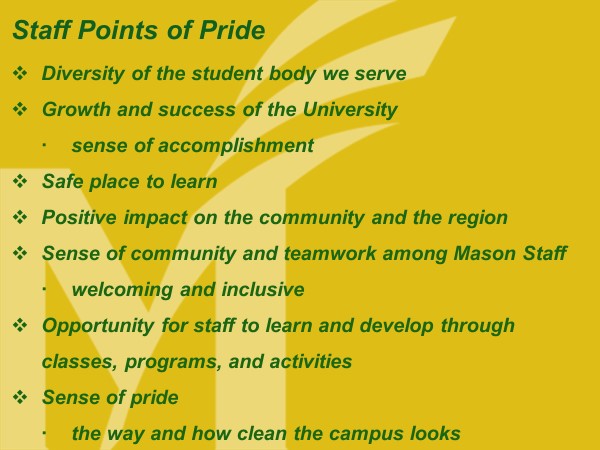
Does this list capture the points that make you proud to work at Mason? To check, fill in these blanks with top-of-mind answers:
I like Mason because . . .
I can help Mason transform into . . .
Mason is . . . to me.
This might strike you as a touchy-feely exercise. Maybe it is. But identifying the ways you take pride in where you work is important. We all know that workplace satisfaction cannot—and should not—hinge entirely on compensation, even though salaries continue to be our top priority with university officials and the Commonwealth of Virginia.
Please share your thoughts regarding pride points by clicking here. We are soliciting feedback on this topic until the close of business on December 1.
In a related part of this process, please join us on December 6 in Merten Hall, Room 1201, at 10:30 a.m. for our next Staff Senate meeting. Bring your concerns and frustrations regarding work with you. We have invited Assistant Vice President of Human Resources Pat Donini and Shernita Parker to talk about the framework for “When things work well, what does it look like?” We are going to approach issues from a positive angle to try to turn problems into solutions. Join us!
Also at our meeting this week, Vice President for Human Resources Linda Harber and Shernita Parker shared information about Employee Assistance options at Mason.
Please be aware of what employee services—financial and otherwise—are available to you. Particularly now. We are easing into the holiday season when finances can become tight, emotions can heighten, and everyone is away from their work support systems with two breaks. The relatively underutilized Employee Assistance Program can be a tremendous resource for you. If you, or a fellow Mason employee, is struggling financially, please seek confidential assistance with Employee Relations and Employee Assistance.
Think of the availability of these services just as you would your medical insurance plan—as a valuable resource that you earn and pay for as a Mason employee.
Thank you!
Very Respectfully,
Christopher Maier
Chair, Staff Senate
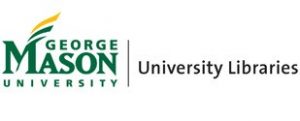 University Libraries hosts a ton of great workshops. Check out their schedule to see what is coming up for November and December.
University Libraries hosts a ton of great workshops. Check out their schedule to see what is coming up for November and December.
Here is a snapshot:
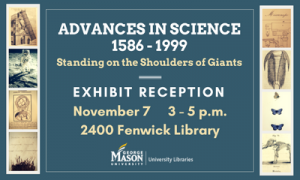 Bioscience. Space Exploration. Engineering. Information Technology. These are but a few of the rapidly advancing fields of science which affect our modern lives. Achievements in these disciplines were built – and continue to build – upon discoveries made by preceding generations of scientists. As Sir Issac Newton famously wrote, “If I have seen further, it is by standing on the shoulders of giants.”
Bioscience. Space Exploration. Engineering. Information Technology. These are but a few of the rapidly advancing fields of science which affect our modern lives. Achievements in these disciplines were built – and continue to build – upon discoveries made by preceding generations of scientists. As Sir Issac Newton famously wrote, “If I have seen further, it is by standing on the shoulders of giants.”
The exhibit Advances in Science 1586 -1999 Standing on the Shoulders of Giants explores the layered nature of scientific research, in which new knowledge is gained over the framework of each new discovery. In this exhibit, we see how the scientific method, first advocated by Sir Francis Bacon, informed the methodology of naturalist, Charles Darwin and later, the scientists who discovered DNA, Watson and Crick. In the field of applied mathematics, the theories espoused by Euclid during the 3rd Century, B.C. created a system of mathematical thinking that would not be expanded until the 19th century. And even as applied mathematics advances and paradigms shift, the work of Euclid remains relevant.
This exhibition explores the evolution of scientific thought through rare books, archival documents, and photographs. It examines two main branches of science: the life sciences and applied mathematics. Featuring the works of Euclid, Bacon, Spallanzani, Pasteur, Linnaeus, and Darwin, Advances in Science 1586 -1999 Standing on the Shoulders of Giants spans the period between the formulation of the scientific method to the construction of the International Space Station. A reception will be held on November 7, 3-5 p.m., Special Collections Research Center, 2400 Fenwick Library.
For more information, please contact Rebecca Bramlett, rbramlet@gmu.edu, 703-933-2058.
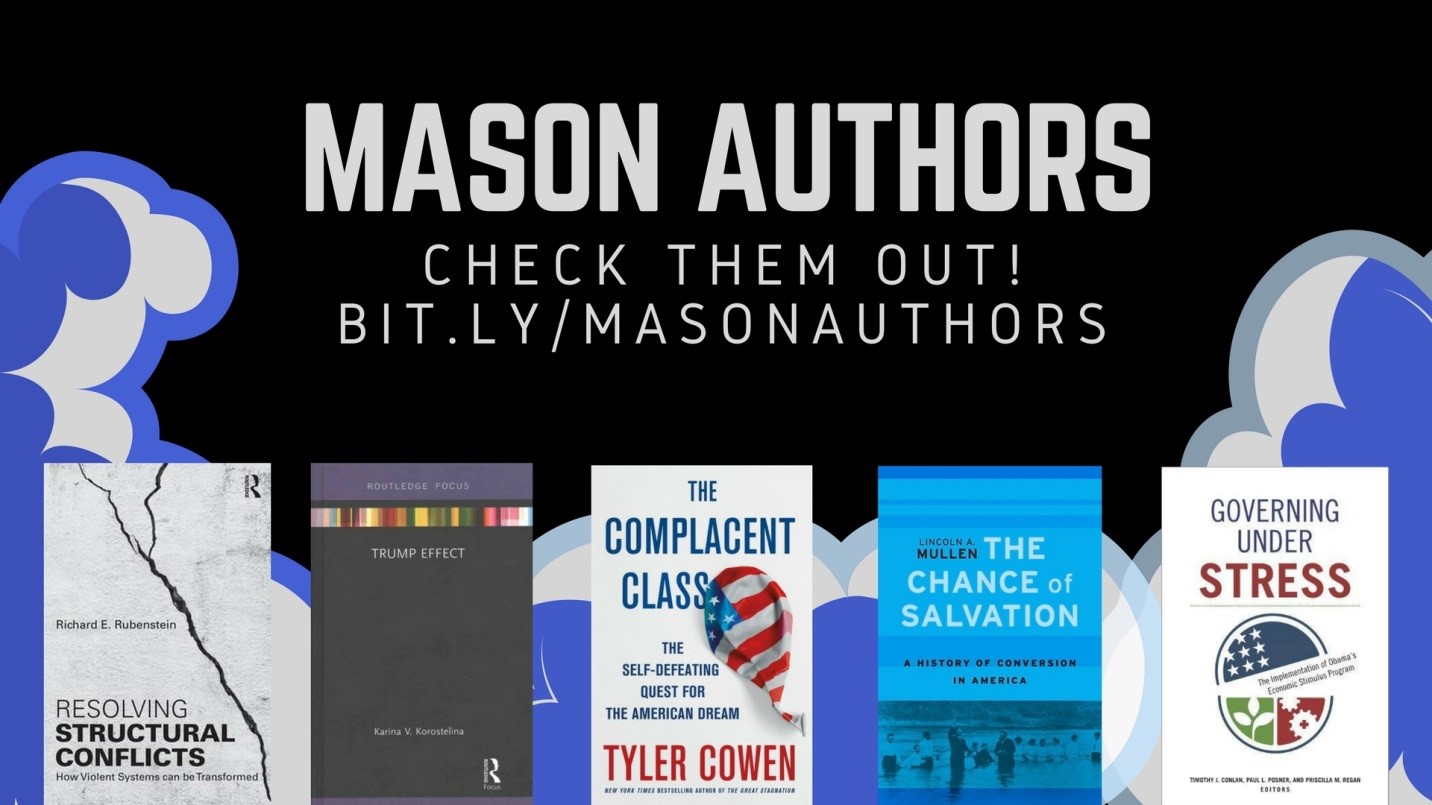 Five books to pick up on Authors’ Month
Five books to pick up on Authors’ Month
November, Authors’ Month, is the ideal time to celebrate the commuter’s companion and a well-thumbed fireplace snuggle buddy. The typical American reads four books each year, according to Pew Research, and 65 percent have read a print book in the last year.
Library-lovers, rejoice: University Libraries offers free access, wherever you are, to over 3 million books and e-books. This means the nostalgic smell of paper and ink isn’t going anywhere soon.
We want to support authors and promote literacy this month, so here are five books by Mason faculty/alumni authors to get you reading.
Mason Spirit features a full list of faculty and alumni authors with Q&A sections by select authors. We encourage you to read our Faculty Author Collection and tweet about what you read using #MasonAuthors.
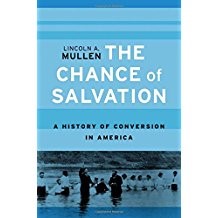 |
The Chance of Salvation: A History of Conversion in America Lincoln A. Mullen, assistant professor, History and Art HistoryThe Chance of Salvation (Harvard University Press, August 2017) focuses on the issue of religious conversion among young people in America and their willingness to change faiths. Mullen explores various historical constructs that formed the American idea that religion is a matter of personal choice rather than a familial expectation, including the diversity of values that each religion present in the United States incorporates into practice. |
 |
Trump Effect Karina V. Korostelina, professor, School for Conflict Analysis and ResolutionIn Trump Effect (Routledge, October 2016) Korostelina explains how the support for Trump among the American general public is based on three complementary pillars: 1) Trump champions a specific conception of American national identity that empowers his supporters, 2) Trump’s leadership has, to an extent, been crafted from his ability to recognize where and with whom he can get the most return on his investment, and 3) Trump challenges the existing political balance of power within the United States and globally. |
 |
Governing Under Stress: The Implementation of Obama’s Economic Stimulus Program Timothy J. Conlan, Priscilla M. Regan, and Paul L. Posner, Schar School of Policy and GovernmentThis book (Georgetown University Press, January 2017) presents perspectives on the implementation of the American Recovery and Reinvestment Act, its management within all levels of government, and its portrayals in the media and public perception. Contributors draw upon more than 200 interviews and nationwide field research to present insights into the challenges facing public policy and management. |
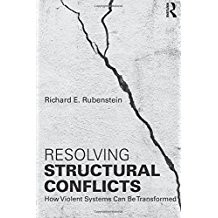 |
Resolving Structural Conflicts: How Violent Systems Can Be Transformed Richard E. Rubenstein, University Professor, School for Conflict Analysis and ResolutionResolving Structural Conflicts (Routledge, January 2017) analyzes how certain types of social systems generate violent conflict and discusses how these systems can be transformed to create the conditions for positive peace. The book addresses a key issue in the field of conflict studies: what to do about violent conflicts that are not the results of misunderstanding, prejudice, or malice, but the products of a social system that generates violent conflict as part of its normal operations. |
 |
The Complacent Class: The Self-Defeating Quest for the American Dream Tyler Cowen, BS Economics ’83, Holbert L. Harris Chair of Economics and General Director of the Mercatus CenterAmericans’ restlessness and willingness to move, take risks, and adapt to change has produced a dynamic economy and a tradition of innovation. But, according to Cowen, Americans today have broken from this tradition―we’re working harder than ever to avoid change. The Complacent Class (St. Martin’s Press, February 2017) argues this cannot go on forever. |
 George Mason University is required to observe applicable Occupational Safety and Health Administration (OSHA) regulations. One of OSHA’s requirements is to educate employees on building evacuation procedures and fire prevention. With this in mind, we encourage you to become familiar with the university’s building evacuation procedures and fire safety resources.
George Mason University is required to observe applicable Occupational Safety and Health Administration (OSHA) regulations. One of OSHA’s requirements is to educate employees on building evacuation procedures and fire prevention. With this in mind, we encourage you to become familiar with the university’s building evacuation procedures and fire safety resources.
Evacuation Procedures: The following procedures must be observed when a fire alarm is activated or you are notified to evacuate a building by Mason Alert or emergency response personnel.
Evacuation and Fire Safety Plans: Evacuation Plans are posted throughout all university buildings that identify primary and alternate evacuation routes, fire extinguisher locations, pull station locations, and the location of AED if one is available. Evacuation Plans also indicate recommended designated assembly areas; however, each office is encouraged to identify their own designated assembly area and record it in the Emergency Procedures Guide (flip book) provided by Environmental Health and Safety (EHS). If your office/unit requires Emergency Procedures Guides, please contact EHS.
Specific instructions on how to evacuate a building is documented in the university’s Emergency Evacuation Guide. The university also maintains a Fire Safety Plan that is available to faculty and staff at ehs.gmu.edu which outlines the strategies and procedures used to protect buildings and work areas from fires.
Thank you for taking the time to educate yourself on the university’s fire safety procedures. If you have any questions or concerns about Mason’s emergency and fire safety programs, please contact EHS at safety@gmu.edu or 703-993-8448.
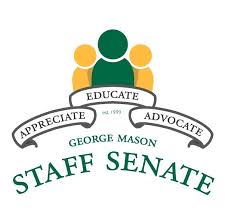 Staff Senate General Meeting
Staff Senate General Meeting
The Staff Senate will host a session to address solutions to common concerns in communication and processes that impede productivity and fluidity.
Wednesday, December 6, from 10:30 a.m. to noon
Fairfax: Merten Hall, Room 1201
Arlington: Founders Hall, Room 720 (telepresence)
Science and Technology: Colgan Hall, Room 221 (telepresence)
Submit your questions for our guest speakers:
To promote dialogue at the Staff Senate general meetings, the Senate is collecting questions from constituents. This is your opportunity to ask university leadership about things that are important to you as Mason staff! Submit your question in advance using the online submission form or email your question to staffsenate@gmu.edu. You may include your name, or you may ask to remain anonymous.
Staff Senate reserves the right to determine which questions are asked during the meeting. Any selected questions that are not asked during the session due to time constraints will be emailed to the guest speaker, and the responses will be published in the Staff Senate newsletter at a later date.
All who attend the Staff Senate general meeting are welcome to ask questions in-person, during the session.
For questions, contact staffsenate@gmu.edu.
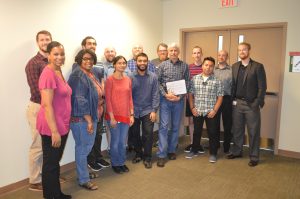

Congratulations to the 2017 Outstanding Supervisors!
Congratulations to Chief Carl T. Rowan, Jr, chief of police, Mason Police and Public Safety Department, and Curtis McNay, director of IT security, Information Technology Services. Chief Rowan and Mr. McNay were selected from nearly 30 incredible nominations of diverse candidates from varying departments and campuses. The Awards Committee, a seven-person committee in the Staff Senate, reviews nominations each year. These two candidates stood out among their peers and were recognized for their outstanding contribution to their departments and in the following areas:
According to his nominators, “Chief Rowan’s commitment to the university, department, and each individual employee is undeniable. He took time to identify each employee’s strengths and develop them to the highest degree of productivity which has translated to job satisfaction.” His nominators also appreciate the opportunities for career growth and how “he has rewarded hard work and inspired creativity, and involves himself in the work of the front line officers and employees to gain an understanding of what everyone’s needs are and to lead by example and motive teamwork.”
According to Mr. McNay’s nominators, “Curtis creates an environment of innovation for his staff where new ideas and strategies are welcomed and further pursued.” His staff feels that “Curtis fosters an environment of learning and engagement. He places an emphasis on participation in training, creating an environment of sharing what each other learns and knows, as well as, generating a collaborative approach to problem-solving. Curtis acknowledges exemplary performance by nominating staff members and project teams for ITS Service and Leadership Awards. “No matter what scope of the project, he always makes sure to convey to his staff how appreciated their input is.”
Chief Rowan and Mr. McNay were recognized at the Outstanding Achievement Awards on November 2, 2017.
The Staff Senate will accept nominations for the 2018 Outstanding Supervisor Award during August 2018. Visit our website to learn more about the criteria and nomination process.
 Staff Senate Announces New Partnership with INOVA Children’s Hospital this Holiday Giving Season!
Staff Senate Announces New Partnership with INOVA Children’s Hospital this Holiday Giving Season!
NEW THIS YEAR! The Staff Senate is collecting new, unwrapped toys for INOVA Children’s Hospital and also any non-perishable food and personal hygiene items for Mason’s Patriot Pantry.
Donations will be collected from December 1−19, 2017. The last day to donate items will be the day of each campus holiday party.
If you would like to begin shopping early and take advantage of some Black Friday or Cyber Monday deals, INOVA Children’s Hospital has set up an Amazon Wish List, a Wish List for currently needed items, and Gift Policies to avoid any items that they cannot accept.
If you have any questions, please direct them to staffsenate@gmu.edu.
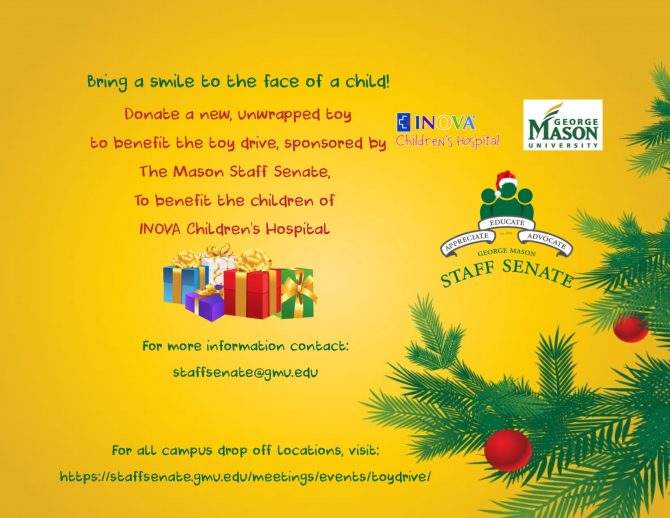
 Getting your education at Mason
Getting your education at MasonWhether you want to brush up on your skills, learn something new, or pursue a degree, life-long learning is a wonderful benefit of working at Mason! Check out your classification below to see what benefit you’re eligible for.
Step 1: Apply for admission (the application fee is waived for Mason employees)
Step 2: Check to see if you were accepted into the program
Step 3: Register for courses (course fees will also be waived)
Step 4: Complete an Employee Tuition Exemption Request form for each course in which you are registered in each semester
Step 5: Submit your Tuition Exemption Request(s) to your supervisor/manager for his/her signature
Step 6: Submit your signed Employee Tuition Exemption Request(s) to Student Accounts after you have registered, but prior to the payment due date
For more information, visit hr.gmu.edu/learning/waivers.php
To see the policy, visit universitypolicy.gmu.edu/policies/employee-tuition-exemption-benefit